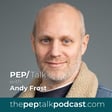
With Karen Swallow Prior
From classical literature to throw-away tweets, communication and language are part of how we reflect the image of a God who is revealed by his Word. This time on PEP Talk, Andy and Kristi speak with US academic and author Karen Swallow Prior, exploring the touchpoints we have with the entire human race in the great books and stories of our culture. How can we make use of these when sharing the gospel?
Dr Karen Swallow Prior is Research Professor of English and Christianity and Culture at Southeastern Baptist Theological Seminary. She has written a number of books including On Reading Well: Finding the Good Life through Great Literature (Brazos 2018). Her writing has appeared at Christianity Today, The Atlantic, The Washington Post, First Things, Vox, Relevant, Think Christian, The Gospel Coalition, Religion News Service, Books and Culture and other places. She is a founding member of The Pelican Project, a Senior Fellow at the Trinity Forum, a Senior Fellow at the International Alliance for Christian Education, and a member of the Faith Advisory Council of the Humane Society of the United States.
Facebook: Karen Swallow Prior
Instagram: karenswallowprior
Twitter: @KSPrior



















